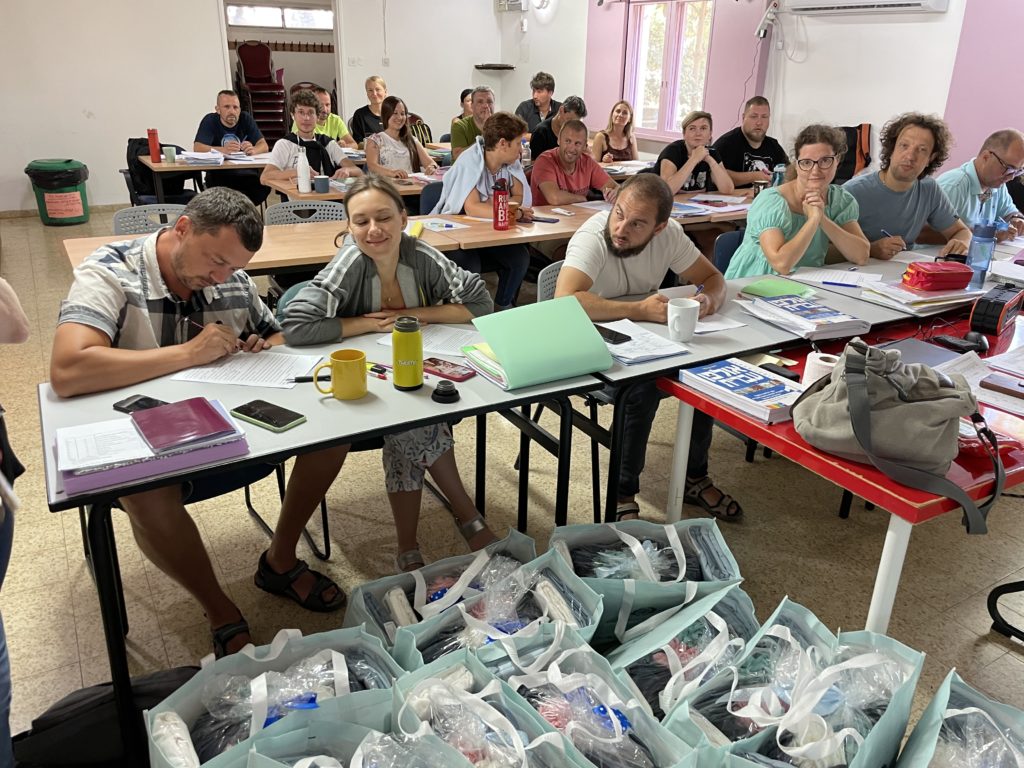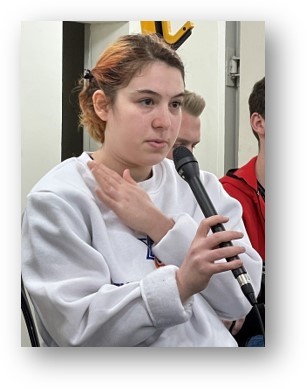
ALIYAH: The Planting of the Lord
Published on: 20.9.2022By: Nicole Yoder, ICEJ Vice President for Aid & Aliyah
Aliyah means “to go up” in a spiritual as well as a physical sense. Hidden within this Hebrew term is the 2,000-year yearning for Jerusalem and Zion that the Jewish people have passed on from generation to generation in exile. The term “Aliyah” is used in Genesis 50:13-14 in reference to Jacob’s bones being brought up from Egypt for burial in the Land of Israel.
Having personally experienced the challenges of moving to a new country where everything changed in one short flight, I know how difficult it can be. Usually, one carefully plans months (or years) before making such a move. First, there is the bureaucracy of submitting paperwork to determine eligibility. Then, ideally one takes time to learn about options and plan where to go live or work or attend school. Arrangements for a host of other practical details must be done before actually getting on the plane. And landing in Israel is only the beginning of the journey.
But what happens if you scarcely had time to pack, or make any plans at all?
Wounded and Alone
Katya recently lost her home in a Russian air strike, the shrapnel from which also took out her front teeth. As if this was not enough, she was also shot in the leg. While hospitalized, she was informed they could not save her leg, even as the security situation outside rapidly deteriorated.
In a bid for safety, private vehicles were called in to evacuate the sick and wounded. Katya was just able to lay down flat between the back seat of a car and the trunk once the seats were folded down. Eight harrowing and painful hours later, she made it across the border to Moldova and eventually to Israel.
The first good news after arriving in Israel was that local doctors had the medical knowledge to save her leg. However, it was going to take months of rehabilitation and Katya would need to recover both physically and from the emotional trauma before she could think of trying to learn Hebrew or begin to work. She also required urgent dental treatment to repair her teeth so that she could one day smile again with confidence and perhaps return to her former profession in sales and marketing.

For Katya, all the most urgent things an immigrant must do on arrival – begin learning Hebrew, finding suitable housing and employment, and developing a new social circle, each challenging in their own right – had to wait as she relied on good-hearted strangers to help her through those first months in Israel. Overcoming these initial challenges is compounded by trying to understand and correctly interpret new societal norms. Also, one must develop a new identity in the new culture, which is a tough process.
Nevertheless, over time society benefits from the development of this rich cultural tapestry. It is like replanting a tree in a new climate with a different type of soil. Initially, the change is a shock to the system and extra care must be given in the new soil for the tree to flourish there.

Sisters in Need of Support
Helping a new immigrant to flourish in a new setting has many facets. Irina, (21) was in her last year of university, and her younger sister Lada (16) had not yet completed high school when their mother woke them up one morning to tell them words Irina never thought she would hear: “We are at war!”
“It was like a dream”, explained Irina. “I only had a half year left to get my diploma… Now we do not know what to do, because both my sister’s school and my university were bombed. We do not know what will happen in the future.”
Initially, the family remained at home anxiously following the news. But eventually they ended up taking shelter with other families in the storage rooms of the local supermarket where her mother worked. When the electric company was bombed a week later, they were plunged into darkness.
At this point, their mother decided it was too dangerous for the girls to remain. Although she felt that her responsibility as the manager of the supermarket required her to remain behind, she arranged an escape for her daughters from Kharkiv to the Polish border on trains loaded to double capacity. The ride took 24 hours, but they made it to Poland and eventually on to Israel.
Asked about how she now sees her future, Irina responded: “I have finished my education. I’m an engineer. I have studied ventilation, air conditioning and heating, and I hope I can continue to work in my profession. I do not know if it is possible now that my university has been bombed, and I have not received my diploma.”
Separated from family and worried about loved ones left behind, Irina and Lada needed support with the basics after making Aliyah. We gave them welcome gift baskets and sponsored a program that offered them a place to stay, Hebrew classes, and assistance to prepare for their next steps in Israel. Ironically, this includes preparation for army service, something each Israeli young person is required to do. Imagine the parents’ relief to know that their daughters were safe, cared for, and had people to help them even though they could not be there in person to advise and assist them.
Many Christians over the years have given generously to ease the challenges of Aliyah because we know that the Lord calls the Gentile nations to help (see, for example, Isaiah 49:22-23). However, the calling to “carry the sons and daughters on our shoulders” is so much more than just providing some pre-Aliyah informational seminars and covering the cost of a flight with extra luggage allowance. It also entails helping each one become “planted” in their native land, something the Lord says He will do “with all My heart and soul” (Jeremiah 32:41).
Make no mistake, this integration phase of being planted and rooted in Israel is crucial. Without it, an immigrant is doomed to an ongoing struggle, or worse, and many become discouraged and seek to leave again, which disheartens others from attempting to come. This rooting process requires giving the tree nourishment and care. This care may come in many forms, such as assistance with housing, learning the language, vocational training, or recertification of professional credentials. Help may be required to close education gaps. Basic needs in the form of a gift of household items or practical mentoring from local natives can make a crucial difference for a family seeking to adapt successfully in Israel.
Katya needed assistance with paying for dental treatment, and we gladly stepped in to help provide it. The needs vary in each situation, but our aid is a tremendous source of comfort and assistance for bewildered and overwhelmed immigrants. Some require help in multiple ways, whereas others need only an initial push in the right direction, and they can go forward on their own.
Thanks to the generosity of our friends worldwide, the ICEJ’s Aliyah work provides essential aid for all the stages of Aliyah, including the crucial Integration phase. Assistance with flights is a joy and a privilege, but we also are there to help address the often-larger challenges awaiting these new immigrants once they get off the plane.
Help us plant more Jewish families in their Promised Land of Israel.
Read more on: Katya’s story, ICEJ giving welcome packages, and housing assistance